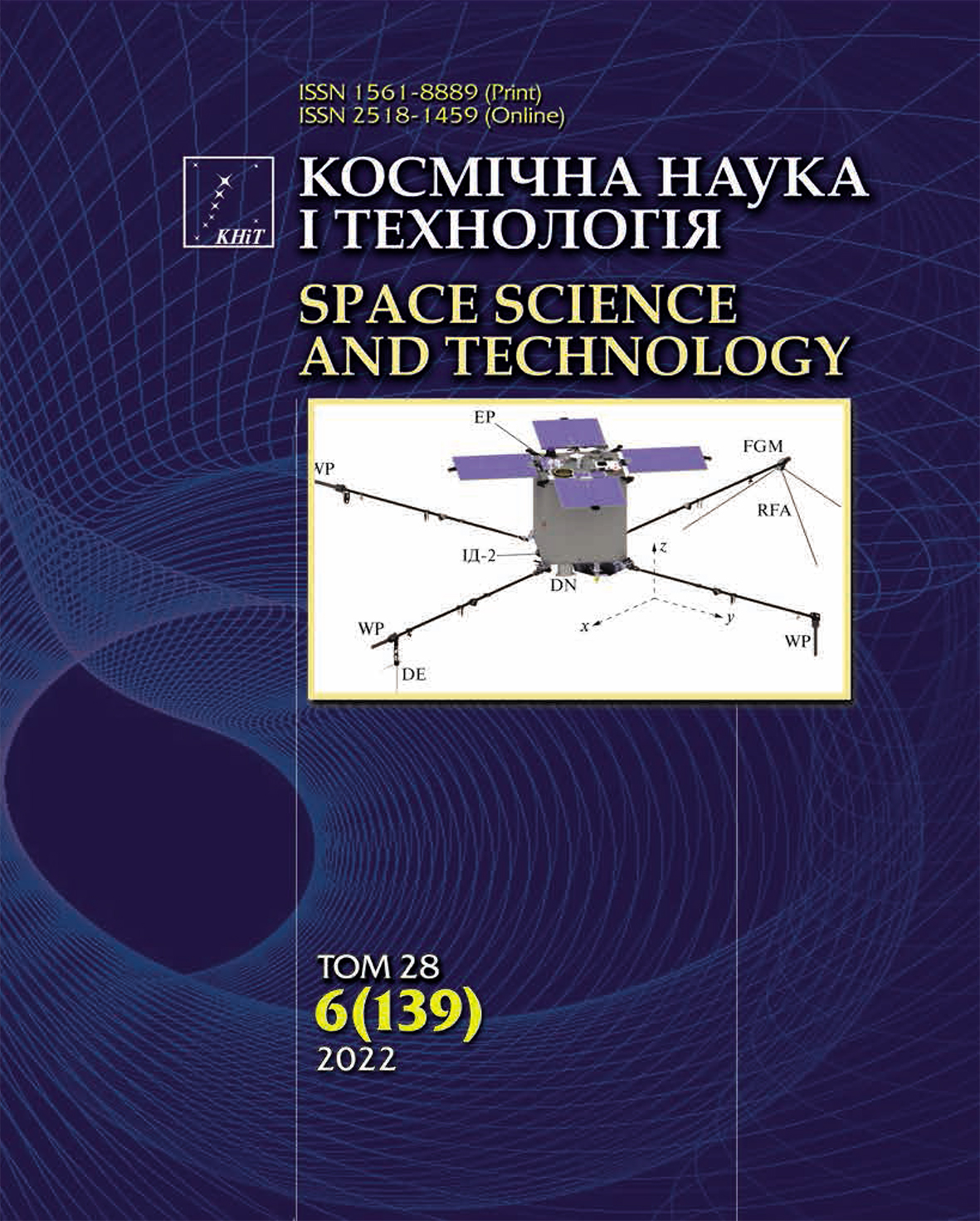Wave disturbances of the atmosphere in a spatially inhomogeneous flow
DOI:
https://doi.org/10.15407/knit2022.06.025Keywords:
acoustic-gravity wave, polar thermosphere, spatially inhomogeneous flow.Abstract
Analysis of measurements on the Dynamics Explorer 2 satellite indicates a close connection between atmospheric wave disturbances and wind circulation in the polar thermosphere. According to satellite observations, large-amplitude acoustic-gravity waves are systematically observed in the regions of formation of powerful wind systems. At the same time, the azimuths of AGW propagation are spatially consistent with the directions of wind circulation. Waves propagate mainly against the wind, and their amplitude is approximately proportional to the wind speed. In order to explain the experimental data, the paper theoretically investigated the changes in the amplitudes of AGW in a horizontally inhomogeneous wind flow. The dispersion equation of the AGW in the reference frame of the medium, which moves with a non-uniform speed, was obtained. When obtaining it, inertial forces were taken into account, as well as the change in the background density of the atmosphere in an inhomogeneous flow. It is shown that under the slow change in wind speed, the real part of this equation coincides with the dispersion equation of AGW for a stationary medium. An expression for the change in the amplitude of waves in a moving medium was obtained, according to which in an oncoming inhomogeneous wind, the amplitude of the wave increases approximately according to a linear law, which is consistent with the data of satellite observations.
References
Fedorenko A.K., Kryuchkov E.I. (2011). Distribution of Medium Scale Acoustic Gravity Waves in polar Regions according to Satellite Measurement Data. Geomagn. Aeron., 51, issue 1, p. 527-539.
https://doi.org/10.1134/S0016793211040128
Fedorenko A.K., Kryuchkov E.I. (2013). Wind Control of the Propagation of Acoustic Gravity Waves in the Polar Atmosphere. Geomagn. Aeron., 53, Issue 3. С.394-405.
https://doi.org/10.1134/S0016793213030055
Bretherton F.P., Garrett C.J.R. (1969). Wavetrains in inhomogeneous moving media. Proc. Roy. Soc. 1969. A.302, P.529-554.
https://doi.org/10.1098/rspa.1968.0034
Cowling D.H., Webb H.D., Yeh K.C. (1971). Group rays of internal gravity waves in a wind-stratified atmosphere. J. Geophys. Res. 76. P.213-220.
https://doi.org/10.1029/JA076i001p00213
Fedorenko A.K, Bespalova A.V, Cheremnykh O.K, and Kryuchkov E.I. (2015). A dominant acoustic-gravity mode in the polar thermosphere. Ann. Geophys. 33. Р.101-108.
https://doi.org/10.5194/angeo-33-101-2015
Fedorenko A.K., Kryuchkov E.I., Cheremnykh O.K., Klymenko Yu.O., Yampolski Yu.M. (2018). Peculiarities of acoustic-gravity waves in inhomogeneous flows of the polar thermosphere. Journal of Atmospheric and Solar-Terrestrial Physics. 178. Р. 17-23.
https://doi.org/10.1088/1475-7516/2018/10/009
Hines C.O. Internal gravity waves at ionospheric heights. Can. J. Phys. 1960. 38. P. 1441-1481.
https://doi.org/10.1139/p60-150
Innis J.L., Conde M. (2002). Characterization of acoustic-gravity waves in the upper thermosphere using Dynamics Explorer 2 Wind and Temperature Spectrometer (WATS) and Neutral Atmosphere Composition Spectrometer (NACS) data. J. Geophys. Res. 107, NO A12.
https://doi.org/10.1029/2002JA009370
Killeen T.L., Won Y.I., Nicieyewski R.J., Burns A.G. (1995). Upper thermosphere winds and temperatures in the geomagnetic polar cap: Solar cycle, geomagnetic activity, and interplanetary magnetic fields dependencies. J. Geophys. Res. 100. P. 21327 -21342.
https://doi.org/10.1029/95JA01208
Lighthill J. Waves in Fluids, Cambridge University Press, 1978. 504 р.
Lühr H., Rentz S., Ritter P., Liu H., Häusler K. (2007). Average thermospheric wind pattern over the polar regions, as observed by CHAMP. Ann. Geophys. 25. P. 1093 -1101.www. ann-geophys.net/25/1093/2007
https://doi.org/10.5194/angeo-25-1093-2007
Tolstoy I. The theory of waves in stratified fluids including the effects on gravity and rotation. (1963). Rev. of Modern Phys. 35, N 1. P. 207- 230.
https://doi.org/10.1103/RevModPhys.35.207
Vadas S. L., Fritts M. J. (2005). Thermospheric responses to gravity waves: Influences of increasing viscosity and thermal diffusivity. J. Geophys. Res. 110, D15103,
https://doi.org/10.1029/2004JD005574
Williams P. J. S., Lewis R. V., Virdi T. S., Lester M., Nielsen E. (1992). Plasma flow bursts in the auroral electrojets. Ann. Geophysicae. 10. Р. 835-848.


